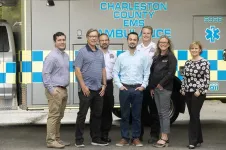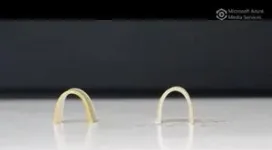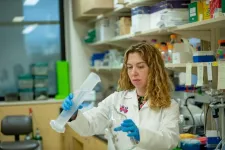(Press-News.org) In the U.S., someone has a stroke every 40 seconds and dies from it every three minutes and 14 seconds, according to the Centers for Disease Control and Prevention. When it comes to stroke, experts echo the fact that time is brain. Faster treatment translates to better outcomes, and certain treatments, like the clot-busting drug tPA, have a strict time window for administration.
“The quicker that we can get the patient to treatment, the quicker we can have a good outcome,” said Dustin LeBlanc, M.D., director of Prehospital Medicine and associate chief medical officer for Emergency Management at the Medical University of South Carolina (MUSC). “But the big step in between – that is diagnostic studies.”
To accelerate diagnostic studies, a team of MUSC researchers, including LeBlanc, partnered with Charleston County Emergency Medical Services (EMS) to equip an ambulance with a portable MRI. The team was led by Donna Roberts, M.D., professor in the Department of Radiology and Radiological Sciences at MUSC and the deputy chief scientist for the International Space Station National Lab, and included Jillian Harvey, Ph.D., a professor in the College of Health Professions. Their findings, reported in the October issue of the Journal of Stroke and Cerebrovascular Diseases, showcased the potential of the MRI-equipped ambulance.
An earlier trial in collaboration with Georgetown County EMS laid the foundation for this human trial by showing that images could be obtained in a moving ambulance on a standardized calibration model.
The project received funding from MUSC’s Blue Sky Award program, aimed at supporting high-risk research that tackles major medical and scientific challenges.
How the device could improve stroke care
Roberts thinks the new technology could be a game-changer for stroke care decision-making.
“If you're somebody who could just receive tPA, you might go to a local hospital, while those who need to have advanced procedures, such as interventional neuroradiology, would go to a different hospital,” she said. “The imaging provided by the portable MRI scanner in the ambulance could help make that decision.”
Harvey thinks that it will also speed up stroke response times.
“If we can get that information in transit and the decision process going before they even arrive at the hospital, then we can shorten the time to care and treatment,” she said.
Harvey is working with Kit Simpson, DrPh, also a professor in the College of Health Professions, to analyze state stroke data to see where MRI-equipped ambulances are most needed.
“The real benefit may come in rural areas where patients may be hours or further away from an MRI,” said Harvey.
For LeBlanc, it’s all about how cutting-edge technology can transform and improve patient care.
“If you think about where defibrillators were 50 years ago, they were hundreds of pounds, and it really took out-of-the-box thinking to imagine they could be portable. And now, they're public access points,” he said. “The MRI-equipped ambulance is just another example of technology helping us to develop ways to make things faster, lighter, smaller, more portable and to get it to the patient as quickly as possible.”
Ambulances equipped with CT scanners, known as mobile stroke units, are already used by some medical centers. However, they have limitations, including radiation exposure. The portable MRI has no radiation risk, and because it has a much lower magnetic field than traditional MRI, safety concerns regarding metal near the system are minimized, allowing operation of other medical or electrical equipment. Traditional MRI imaging can also identify stroke patients without a clear stroke timeline. Further research will determine if portable MRIs can achieve the same.
Taking the MRI-equipped ambulance for a trial run
The research team worked with Charleston County EMS to secure a portable MRI in one of its ambulances and capture imaging while driving slowly around a parking lot, which had been blocked off with the help of MUSC Facilities. During the trial run, the research team obtained imaging of a healthy volunteer. Diagnostic-quality images were obtained and successfully transmitted to hospital radiologists for review.
“This was really a team sport, with all aspects of MUSC and Charleston County EMS coming together for the mission of research,” said LeBlanc.
The road ahead
Despite these early promising results, more work needs to be done to see if diagnostic-quality images can be obtained when the ambulance is traveling at full speed. The team is also working with the Clemson School of Engineering to optimize the ergonomic fit of the MRI in the ambulance. With further technological advancements and clinical studies, MRI-equipped ambulances could become a game-changer in the field of emergency medicine, ensuring that stroke patients receive the best care possible, even before they reach the hospital.
“Ultimately, we need to stop thinking about telling patients to come to us,” said Roberts. “Instead, we need to be thinking about how we can take medicine to the patient.”
# # #
About MUSC
Founded in 1824 in Charleston, MUSC is the state’s only comprehensive academic health system, with a unique mission to preserve and optimize human life in South Carolina through education, research and patient care. Each year, MUSC educates more than 3,200 students in six colleges – Dental Medicine, Graduate Studies, Health Professions, Medicine, Nursing and Pharmacy – and trains more than 900 residents and fellows in its health system. MUSC brought in more than $298 million in research funds in fiscal year 2022, leading the state overall in research funding. MUSC also leads the state in federal and National Institutes of Health funding, with more than $220 million. For information on academic programs, visit musc.edu.
As the health care system of the Medical University of South Carolina, MUSC Health is dedicated to delivering the highest-quality and safest patient care while educating and training generations of outstanding health care providers and leaders to serve the people of South Carolina and beyond. Patient care is provided at 16 hospitals (includes owned and equity stake), with approximately 2,700 beds and four additional hospital locations in development; more than 350 telehealth sites and connectivity to patients’ homes; and nearly 750 care locations situated in all regions of South Carolina. In 2022, for the eighth consecutive year, U.S. News & World Report named MUSC Health University Medical Center in Charleston the No. 1 hospital in South Carolina. To learn more about clinical patient services, visit muschealth.org.
MUSC has a total enterprise annual operating budget of $5.1 billion. The nearly 26,000 MUSC family members include world-class faculty, physicians, specialty providers, scientists, students, affiliates and care team members who deliver groundbreaking education, research, and patient care.
END
An MRI-equipped ambulance: A game-changer for stroke care?
Medical University of South Carolina researchers partner with Emergency Medical Services to pilot test the first MRI-equipped ambulance to speed stroke response.
2023-11-02
ELSE PRESS RELEASES FROM THIS DATE:
Repurposed drug offers new potential for managing type 1 diabetes
2023-11-01
INDIANAPOLIS -- A recent study led by Indiana University School of Medicine in collaboration with the University of Chicago Medicine presents exciting future possibilities for the management of type 1 diabetes and the potential reduction of insulin dependency. The researchers’ findings, published in Cell Reports Medicine, suggest repurposing of the drug α-difluoromethylornithine (DFMO) may open doors to innovative therapies in the future.
Type 1 diabetes is a chronic condition wherein the body's immune system mistakenly ...
UCF hires Director of Development and Operations for Virtual Experience Research Accelerator (VERA)
2023-11-01
UCF Hires Director of Development and Operations for Virtual Experience Research Accelerator (VERA)
ORLANDO, Nov. 1, 2023 – Ali Haskins Lisle, Ph.D., has been named the Director of Development and Operations for the UCF-led Virtual Experience Research Accelerator (VERA).
VERA is a nearly $5 million U.S. National Science Foundation project to develop the first large-scale human-machine system for virtual reality human subjects research, with the goals of affording very large studies, very quickly, with populations that ...
Hebrew prayer book fills gap in Italian earthquake history
2023-11-01
The chance discovery of a note written in a 15th century Hebrew prayer book fills an important gap in the historical Italian earthquake record, offering a brief glimpse of a previously unknown earthquake affecting the Marche region in the central Apennines.
Paolo Galli, who found the note in the Apostolic Vatican Library while looking for contemporaneous accounts of another historic Italian earthquake, writes in Seismological Research Letters that the note “not only helps us partially fill a gap in the seismic history ...
UChicago chemists make breakthrough in drug discovery chemistry
2023-11-01
For years, if you asked the people working to create new pharmaceutical drugs what they wished for, at the top of their lists would be a way to easily replace a carbon atom with a nitrogen atom in a molecule.
But two studies from chemists at the University of Chicago, published in Science and Nature, offer two new methods to address this wish. The findings could make it easier to develop new drugs.
“This is the grand-challenge problem that I started my lab to try to solve,” said Mark Levin, ...
Docetaxel use associated with significant reduction in prostate cancer death in very poor prognostic group
2023-11-01
Men with high-grade prostate cancer and low prostate-specific antigen (PSA) levels have a poor prognosis. The question remains as to whether the chemotherapy drug docetaxel, which increases survival in metastatic prostate cancer, can improve the cure rate in these patients.
In a new study, investigators from Brigham and Women’s Hospital, a founding member of the Mass General Brigham healthcare system, a meta-analysis of five prospective randomized clinical trials (RCTs) found that adding docetaxel to standard-of-care (SOC) treatment was associated with a 70% reduction in death from prostate cancer-specific ...
Pet ownership may contribute to health care barriers for people with HIV
2023-11-01
People living with HIV may face hard choices when balancing their own health needs with caring for a pet, a study led by a University of Florida College of Public Health and Health Professions researcher finds.
For the study, which appears in the journal PLOS ONE, 36% of people with HIV who own pets reported delaying health care, not seeking it or said they expect to do so in the future. Financial and other resource concerns, including not having access to pet sitting or boarding services, are among the leading factors that may contribute to health care barriers among pet owners ...
Test detects co-infection by novel species of parasite in severe cases of visceral leishmaniasis
2023-11-01
In recent years, physicians and scientists in parts of Brazil where visceral leishmaniasis (VL) is endemic have seen rising numbers of cases of co-infection by Leishmania infantum and Crithidia, also a protozoan but hitherto believed to be a mosquito parasite that cannot infect humans or other mammals. Accurate diagnosis is hindered by a lack of simple specific tests (more at: https://agencia.fapesp.br/42072 and https://agencia.fapesp.br/31581).
To accelerate and facilitate detection of the pathogens involved, supporting appropriate decisions regarding treatment, researchers at the Federal University of São Carlos (UFSCar) have developed a PCR test ...
Dr. Zainab Mahmoud to receive the 2023 Dr. Nanette K. Wenger Research Goes Red® Award
2023-11-01
DALLAS, Nov. 1, 2023 – The American Heart Association will present the 2023 Dr. Nanette K. Wenger Research Goes Red® Award to Zainab Mahmoud, M.D., M.Sc., of Washington University School of Medicine in St. Louis. This award will be presented during the opening session of the Association’s Scientific Sessions 2023 on Saturday, Nov. 11. The meeting, to be held in Philadelphia, Saturday, Nov. 11 through Monday, Nov. 13, is a premier global exchange of the latest scientific advancements, ...
Lepore chosen to lead Public Policy & Aging Report
2023-11-01
The Gerontological Society of America (GSA) — the nation’s largest interdisciplinary organization devoted to the field of aging — has named Michael Lepore, PhD, of the University of Massachusetts (UMass) Amherst as the next editor-in-chief of the journal Public Policy & Aging Report, effective January 2024.
“I am honored to serve as editor-in-chief of Public Policy & Aging Report, which for nearly 30 years has provided non-partisan analyses of aging-related policy issues,” Lepore said. “This venerable journal has been a mainstay of my training and professional ...
Dr. Mary McGrae McDermott to be awarded the 2023 Clinical Research Prize
2023-11-01
DALLAS, Nov. 1, 2023 — The American Heart Association will present the 2023 Clinical Research Prize to Mary McGrae McDermott, M.D., FAHA, of Northwestern University’s Feinberg School of Medicine in Chicago. The Clinical Research Prize is awarded annually to physicians or scientists who are advancing clinical science in support of the Association’s mission.
Dr. McDermott has dedicated her career to advancing medical knowledge of peripheral artery disease (PAD). She will be recognized during the presidential session on Sunday, Nov. 12, 2023 at the Association’s Scientific Sessions ...
LAST 30 PRESS RELEASES:
ACC announces inaugural fellow for the Thad and Gerry Waites Rural Cardiovascular Research Fellowship
University of Oklahoma researchers develop durable hybrid materials for faster radiation detection
Medicaid disenrollment spikes at age 19, study finds
Turning agricultural waste into advanced materials: Review highlights how torrefaction could power a sustainable carbon future
New study warns emerging pollutants in livestock and aquaculture waste may threaten ecosystems and public health
Integrated rice–aquatic farming systems may hold the key to smarter nitrogen use and lower agricultural emissions
Hope for global banana farming in genetic discovery
Mirror image pheromones help beetles swipe right
Prenatal lead exposure related to worse cognitive function in adults
Research alert: Understanding substance use across the full spectrum of sexual identity
Pekingese, Shih Tzu and Staffordshire Bull Terrier among twelve dog breeds at risk of serious breathing condition
Selected dog breeds with most breathing trouble identified in new study
Interplay of class and gender may influence social judgments differently between cultures
Pollen counts can be predicted by machine learning models using meteorological data with more than 80% accuracy even a week ahead, for both grass and birch tree pollen, which could be key in effective
Rewriting our understanding of early hominin dispersal to Eurasia
Rising simultaneous wildfire risk compromises international firefighting efforts
Honey bee "dance floors" can be accurately located with a new method, mapping where in the hive forager bees perform waggle dances to signal the location of pollen and nectar for their nestmates
Exercise and nutritional drinks can reduce the need for care in dementia
Michelson Medical Research Foundation awards $750,000 to rising immunology leaders
SfN announces Early Career Policy Ambassadors Class of 2026
Spiritual practices strongly associated with reduced risk for hazardous alcohol and drug use
Novel vaccine protects against C. diff disease and recurrence
An “electrical” circadian clock balances growth between shoots and roots
Largest study of rare skin cancer in Mexican patients shows its more complex than previously thought
Colonists dredged away Sydney’s natural oyster reefs. Now science knows how best to restore them.
Joint and independent associations of gestational diabetes and depression with childhood obesity
Spirituality and harmful or hazardous alcohol and other drug use
New plastic material could solve energy storage challenge, researchers report
Mapping protein production in brain cells yields new insights for brain disease
Exposing a hidden anchor for HIV replication
[Press-News.org] An MRI-equipped ambulance: A game-changer for stroke care?Medical University of South Carolina researchers partner with Emergency Medical Services to pilot test the first MRI-equipped ambulance to speed stroke response.




